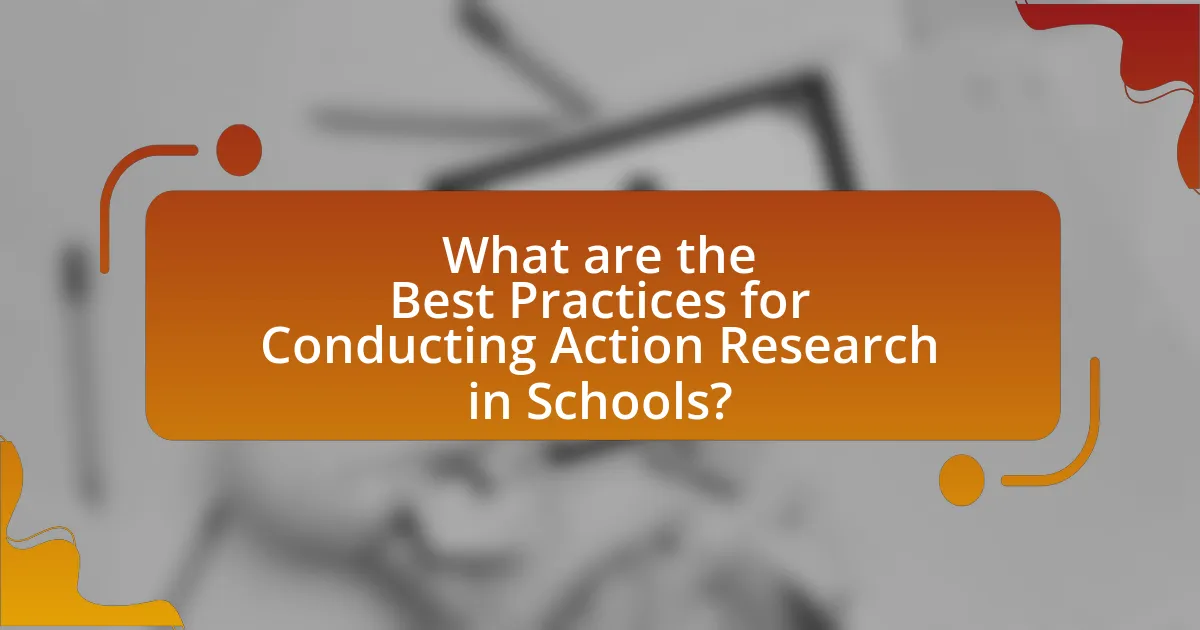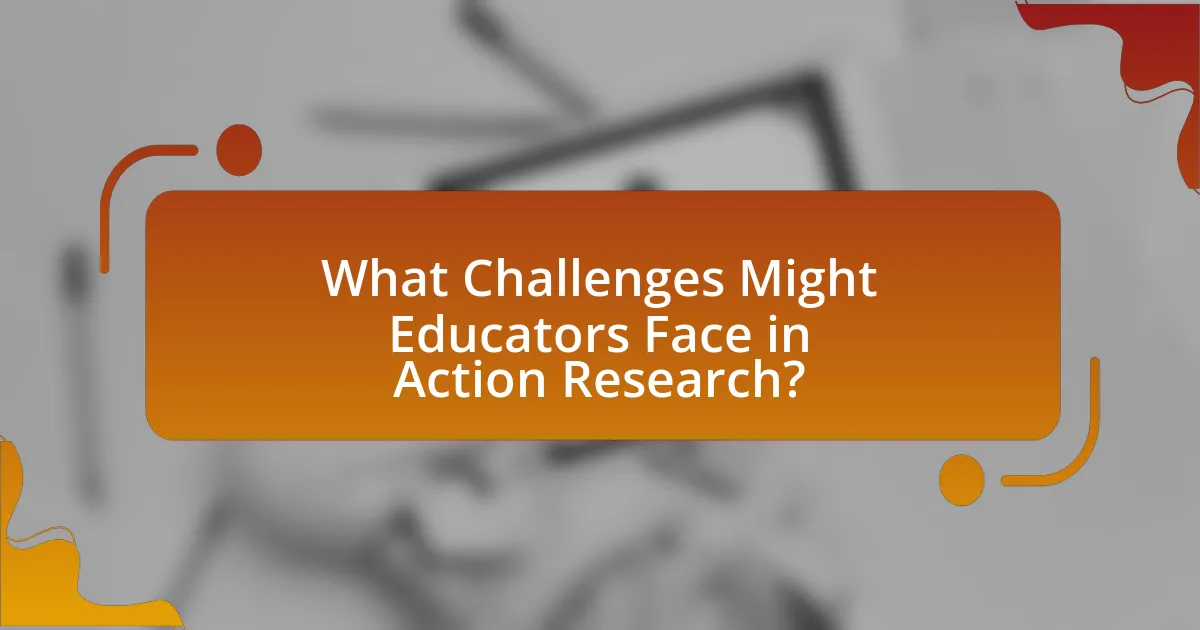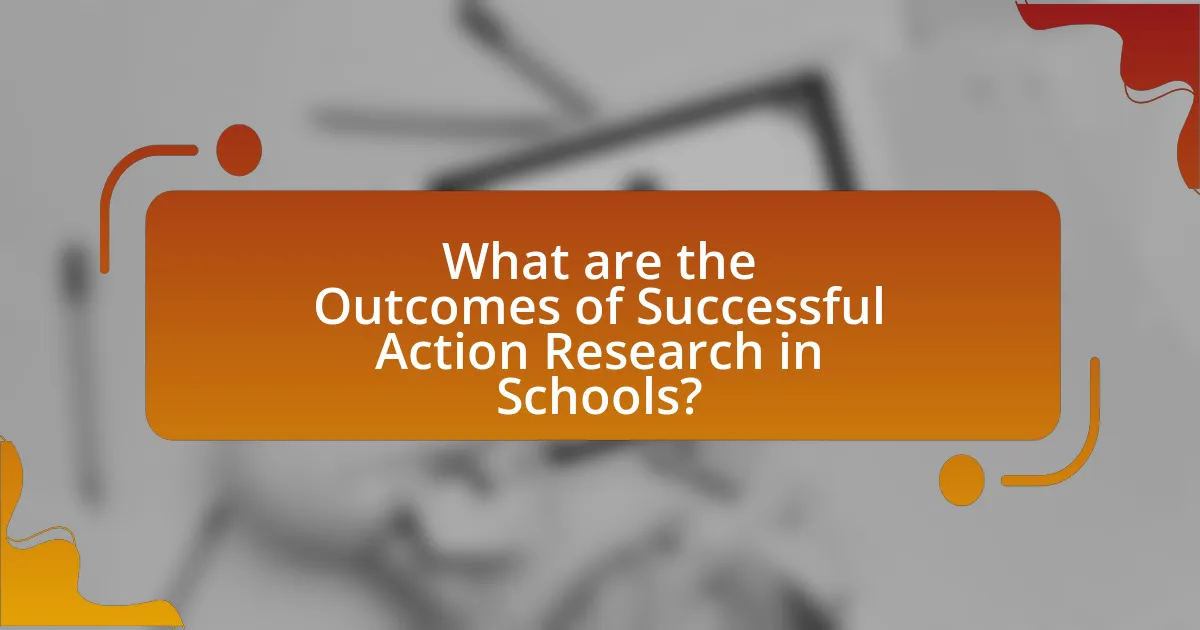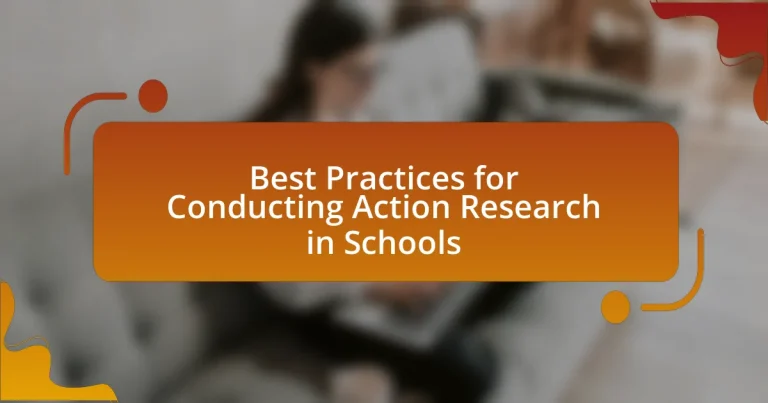The article focuses on best practices for conducting action research in schools, emphasizing the importance of clearly defining research questions, involving stakeholders, and employing a systematic approach. It outlines key steps in the action research process, including problem identification, data collection, and reflection on findings, while highlighting the significance of collaboration among educators. Additionally, the article addresses challenges educators may face, such as time constraints and lack of administrative support, and offers strategies to overcome these barriers. Ethical considerations, methods for data collection, and the positive impact of action research on teaching practices and student outcomes are also discussed, providing a comprehensive overview of effective action research implementation in educational settings.

What are the Best Practices for Conducting Action Research in Schools?
The best practices for conducting action research in schools include clearly defining the research question, involving stakeholders, using a systematic approach, and reflecting on the findings. Clearly defining the research question ensures that the focus remains on specific issues that need addressing, which is crucial for effective outcomes. Involving stakeholders, such as teachers, students, and parents, fosters collaboration and enhances the relevance of the research. A systematic approach, which includes planning, acting, observing, and reflecting, allows for structured data collection and analysis, leading to informed decisions. Finally, reflecting on the findings helps to evaluate the effectiveness of the interventions and informs future practices. These practices are supported by research indicating that structured action research leads to improved educational outcomes and greater engagement among participants.
Why is Action Research Important in Educational Settings?
Action research is important in educational settings because it empowers educators to systematically investigate their teaching practices and improve student outcomes. By engaging in action research, teachers can identify specific challenges within their classrooms, implement targeted interventions, and assess the effectiveness of these strategies through data collection and analysis. Research indicates that action research fosters a culture of continuous improvement and professional development among educators, leading to enhanced instructional practices and increased student engagement. For instance, a study by Sagor (2000) highlights that teachers who participate in action research report greater confidence in their teaching abilities and a deeper understanding of their students’ needs.
What role does action research play in improving teaching practices?
Action research plays a critical role in improving teaching practices by enabling educators to systematically investigate their own teaching methods and student learning outcomes. This reflective process allows teachers to identify specific areas for improvement, implement targeted interventions, and assess their effectiveness through data collection and analysis. For instance, a study by Sagor (2000) highlights that teachers who engage in action research report enhanced instructional strategies and increased student engagement, demonstrating the tangible benefits of this approach in real classroom settings.
How can action research contribute to student learning outcomes?
Action research can significantly enhance student learning outcomes by allowing educators to systematically investigate their teaching practices and make data-driven adjustments. This iterative process enables teachers to identify specific areas for improvement, implement targeted interventions, and assess their effectiveness in real-time. For instance, a study by Sagor (2000) demonstrated that teachers who engaged in action research reported improved student engagement and academic performance, as they tailored their instructional strategies based on direct feedback and observation. By fostering a reflective practice, action research empowers educators to create a more responsive and effective learning environment, ultimately leading to better student achievement.
What are the Key Steps in Conducting Action Research?
The key steps in conducting action research include identifying a problem, planning the research, collecting data, analyzing the data, reflecting on the findings, and taking action based on the results. First, educators must identify a specific issue or area for improvement within their school or classroom. Next, they develop a research plan that outlines the objectives, methods, and timeline. Data collection follows, utilizing various methods such as surveys, interviews, or observations to gather relevant information. After data collection, the analysis phase involves interpreting the data to identify patterns or insights. Reflection on the findings allows educators to consider the implications for practice, leading to informed action steps aimed at addressing the identified problem. This cyclical process emphasizes continuous improvement and adaptation in educational settings.
How do you identify a research problem in a school setting?
To identify a research problem in a school setting, educators should begin by observing and analyzing specific challenges or gaps in student learning and engagement. This process involves collecting data through surveys, interviews, or assessments to pinpoint areas needing improvement. For instance, a study by the National Center for Education Statistics found that 20% of students reported feeling disengaged in their classes, highlighting a potential research problem related to student engagement. By focusing on these observable issues and supporting them with quantitative or qualitative data, educators can effectively define a relevant research problem that addresses the needs of their students and the school community.
What methods can be used to collect data for action research?
Qualitative and quantitative methods can be used to collect data for action research. Qualitative methods include interviews, focus groups, and observations, which provide in-depth insights into participants’ experiences and perspectives. Quantitative methods involve surveys and assessments that yield numerical data, allowing for statistical analysis of trends and patterns. Research by Stringer (2014) in “Action Research” emphasizes the importance of using a combination of these methods to triangulate data, enhancing the validity and reliability of findings in educational settings.
What Ethical Considerations Should be Taken into Account?
Ethical considerations in action research in schools include informed consent, confidentiality, and the potential impact on participants. Informed consent ensures that all participants understand the purpose, procedures, and risks associated with the research, allowing them to make an educated decision about their involvement. Confidentiality protects the identities and data of participants, which is crucial in maintaining trust and integrity in the research process. Additionally, researchers must consider the potential impact of their findings on the school community, ensuring that the research does not harm participants or the educational environment. These ethical principles are supported by guidelines from organizations such as the American Educational Research Association, which emphasizes the importance of ethical standards in educational research.
How can researchers ensure confidentiality and anonymity in their studies?
Researchers can ensure confidentiality and anonymity in their studies by implementing strict data protection protocols and obtaining informed consent from participants. These protocols include de-identifying data, where personal identifiers are removed or replaced with codes, ensuring that individual responses cannot be traced back to participants. Additionally, researchers should store data securely, using encrypted files and restricted access to sensitive information. Informed consent involves clearly communicating to participants how their data will be used and assuring them that their identities will remain confidential. According to the American Psychological Association, ethical guidelines emphasize the importance of protecting participant privacy to maintain trust and integrity in research.
What are the implications of informed consent in action research?
Informed consent in action research ensures that participants are fully aware of the research purpose, procedures, risks, and benefits, which fosters ethical integrity and trust. This ethical requirement protects participants’ autonomy and rights, allowing them to make informed decisions about their involvement. For instance, the American Psychological Association emphasizes that informed consent is crucial for maintaining ethical standards in research, highlighting that participants must understand what participation entails. Furthermore, obtaining informed consent can enhance the quality of data collected, as participants who feel respected and informed are more likely to engage openly and honestly in the research process.
How can Collaboration Enhance Action Research Efforts?
Collaboration can enhance action research efforts by fostering diverse perspectives and shared expertise among participants. When educators collaborate, they can pool their knowledge, skills, and experiences, leading to more comprehensive data collection and analysis. Research indicates that collaborative action research can improve educational outcomes; for instance, a study by McNiff and Whitehead (2010) highlights that collaborative approaches lead to richer insights and more effective interventions in school settings. This collective engagement not only strengthens the research process but also promotes a culture of continuous improvement within educational institutions.
What are the benefits of involving colleagues in the action research process?
Involving colleagues in the action research process enhances collaboration, fosters diverse perspectives, and improves the quality of research outcomes. Collaboration among colleagues leads to shared ownership of the research, which can increase motivation and commitment to implementing findings. Diverse perspectives contribute to a more comprehensive understanding of the issues being investigated, allowing for richer data collection and analysis. Research indicates that collaborative action research can lead to improved teaching practices and student outcomes, as seen in studies like “Collaborative Action Research: A Handbook for Teachers” by Anne Burns, which highlights the positive impact of teamwork on educational improvement.
How can schools foster a culture of collaboration for action research?
Schools can foster a culture of collaboration for action research by establishing structured professional learning communities (PLCs) that encourage teachers to work together on research projects. These PLCs provide a platform for educators to share insights, discuss challenges, and collaboratively analyze data, which enhances the quality of action research. Research indicates that schools with effective PLCs see improved student outcomes and increased teacher engagement, as collaboration leads to shared ownership of the research process and findings. For instance, a study by Vescio, Ross, and Adams (2008) in “The Impact of Professional Learning Communities on Teaching Practice and Student Learning” highlights that collaborative environments significantly enhance the effectiveness of action research initiatives in educational settings.

What Challenges Might Educators Face in Action Research?
Educators may face several challenges in action research, including time constraints, lack of administrative support, and insufficient training in research methodologies. Time constraints often arise due to the demands of teaching responsibilities, which can limit the time available for conducting research and analyzing data. A study by McNiff and Whitehead (2010) highlights that educators frequently struggle to balance their teaching duties with the rigorous demands of action research. Additionally, without strong administrative support, educators may find it difficult to implement changes based on their findings, as they may lack the necessary resources or encouragement to pursue their initiatives. Furthermore, many educators may not have received adequate training in research methods, which can hinder their ability to design effective studies and interpret results accurately. This lack of training is noted in the research conducted by Cohen, Manion, and Morrison (2011), which emphasizes the importance of professional development in equipping educators with the skills needed for successful action research.
What are Common Barriers to Conducting Action Research?
Common barriers to conducting action research include lack of time, insufficient training, and limited administrative support. Time constraints often hinder educators from engaging in the reflective practices necessary for action research, as they juggle multiple responsibilities. Insufficient training can lead to a lack of understanding of research methodologies, making it difficult for educators to effectively design and implement action research projects. Additionally, limited administrative support can result in a lack of resources and encouragement, which are crucial for fostering a culture of inquiry within schools. These barriers collectively impede the ability of educators to engage in meaningful action research, ultimately affecting the improvement of teaching practices and student outcomes.
How can time constraints impact the action research process?
Time constraints can significantly hinder the action research process by limiting the depth and thoroughness of data collection and analysis. When researchers face tight deadlines, they may rush through critical phases such as planning, implementation, and evaluation, which can lead to incomplete or biased findings. For instance, a study by Stringer (2014) highlights that insufficient time can prevent educators from engaging in reflective practices essential for meaningful insights, ultimately compromising the quality of the research outcomes. Additionally, time limitations may restrict collaboration opportunities among stakeholders, reducing the diversity of perspectives that enrich the research process.
What resources are typically lacking for effective action research?
Effective action research often lacks sufficient time, funding, and access to relevant data. Time constraints hinder educators from thoroughly engaging in the research process, as they juggle multiple responsibilities. Limited funding restricts the ability to acquire necessary materials or resources, such as professional development opportunities or technology. Additionally, inadequate access to relevant data impedes the ability to analyze and draw meaningful conclusions from the research, which is essential for informed decision-making. These resource deficiencies can significantly impact the quality and effectiveness of action research initiatives in educational settings.
How can Educators Overcome These Challenges?
Educators can overcome challenges in conducting action research by implementing structured planning, collaboration, and ongoing professional development. Structured planning allows educators to clearly define research questions and methodologies, ensuring a focused approach. Collaboration with colleagues fosters a supportive environment where educators can share insights and strategies, enhancing the research process. Ongoing professional development equips educators with the necessary skills and knowledge to navigate challenges effectively, as evidenced by studies showing that continuous training improves research outcomes and teacher efficacy.
What strategies can be implemented to manage time effectively?
To manage time effectively, individuals can implement strategies such as prioritization, time blocking, and setting specific goals. Prioritization involves identifying tasks based on their urgency and importance, which allows individuals to focus on what truly matters. Time blocking entails allocating specific time slots for different activities, ensuring dedicated focus and minimizing distractions. Setting specific, measurable, achievable, relevant, and time-bound (SMART) goals provides clarity and direction, enhancing productivity. Research indicates that effective time management can lead to a 25% increase in productivity, as demonstrated in a study by the American Psychological Association, which highlights the correlation between structured time management techniques and improved performance in educational settings.
How can schools provide necessary resources for action research?
Schools can provide necessary resources for action research by allocating funding, offering professional development, and facilitating access to research materials. Funding is essential for purchasing materials, tools, and technology needed for research projects, as evidenced by studies showing that financial support directly impacts the quality of educational research initiatives. Professional development opportunities equip educators with the skills and knowledge to conduct effective action research, which is supported by findings from the American Educational Research Association indicating that training enhances research capabilities. Additionally, schools can create partnerships with local universities or research organizations to provide access to academic resources and mentorship, further enriching the research process.

What are the Outcomes of Successful Action Research in Schools?
Successful action research in schools leads to improved teaching practices, enhanced student learning outcomes, and increased collaboration among educators. Research indicates that when teachers engage in action research, they develop a deeper understanding of their instructional methods, which directly correlates with higher student achievement. For instance, a study by Sagor (2000) found that schools implementing action research saw a 20% increase in student performance metrics over three years. Additionally, successful action research fosters a culture of continuous improvement, where educators share insights and strategies, thereby enhancing professional development and community engagement within the school.
How can Action Research Lead to Sustainable Change?
Action research can lead to sustainable change by fostering continuous improvement through iterative cycles of planning, acting, observing, and reflecting. This method engages educators and stakeholders in a collaborative process that identifies specific challenges within the school environment, allowing for tailored interventions that address those issues effectively. Research indicates that schools implementing action research see enhanced teacher collaboration and increased student engagement, which are critical components for lasting change. For instance, a study by Sagor (2000) highlights that schools utilizing action research reported significant improvements in student performance and teacher satisfaction, demonstrating the method’s effectiveness in creating a culture of ongoing development and adaptation.
What evidence supports the effectiveness of action research in schools?
Action research in schools is supported by evidence demonstrating its positive impact on teaching practices and student outcomes. Studies, such as those conducted by Sagor (2000) and McNiff (2013), show that action research fosters reflective practice among educators, leading to improved instructional strategies. Additionally, a meta-analysis by Koshy (2005) indicates that schools implementing action research report enhanced student engagement and achievement. These findings highlight the effectiveness of action research as a tool for continuous improvement in educational settings.
How can findings from action research be shared with the wider educational community?
Findings from action research can be shared with the wider educational community through various methods such as publishing in academic journals, presenting at conferences, and utilizing online platforms. Academic journals like the “Journal of Educational Action Research” provide a formal avenue for researchers to disseminate their findings, ensuring peer review and credibility. Presenting at educational conferences allows for direct engagement with educators and stakeholders, fostering discussion and collaboration. Additionally, online platforms such as educational blogs, webinars, and social media can reach a broader audience, facilitating the exchange of ideas and practices. These methods collectively enhance the visibility and impact of action research findings within the educational community.
What Best Practices Should Educators Follow for Effective Action Research?
Educators should follow systematic planning, collaboration, and reflection as best practices for effective action research. Systematic planning involves clearly defining research questions, objectives, and methodologies, ensuring that the research is focused and relevant to the educational context. Collaboration with colleagues enhances the research process by incorporating diverse perspectives and expertise, which can lead to more comprehensive findings. Reflection is crucial as it allows educators to analyze the data collected, assess the effectiveness of their interventions, and make informed adjustments to their teaching practices. Research indicates that these practices lead to improved educational outcomes, as evidenced by studies showing that collaborative action research can enhance teacher efficacy and student achievement.
How can educators ensure their action research is systematic and rigorous?
Educators can ensure their action research is systematic and rigorous by following a structured methodology that includes clear research questions, a defined framework for data collection, and thorough analysis. Implementing a cyclical process of planning, acting, observing, and reflecting allows educators to iteratively refine their practices based on evidence. For instance, using established frameworks such as the Plan-Do-Study-Act (PDSA) cycle can enhance the rigor of the research process. Additionally, triangulating data sources—such as surveys, interviews, and observational data—provides a more comprehensive understanding of the research context and strengthens the validity of findings. Research by Stringer (2014) emphasizes the importance of these systematic approaches in ensuring that action research yields reliable and actionable insights.
What tips can help educators reflect on their action research findings?
Educators can enhance their reflection on action research findings by systematically analyzing data, engaging in collaborative discussions, and documenting insights. Systematic data analysis involves reviewing quantitative and qualitative data to identify patterns and trends, which can lead to informed conclusions about teaching practices. Collaborative discussions with colleagues provide diverse perspectives, fostering deeper understanding and critical evaluation of findings. Documenting insights in reflective journals or reports allows educators to track their thought processes and growth over time, reinforcing learning and future application. These strategies are supported by research indicating that reflective practices improve educational outcomes and professional development.


